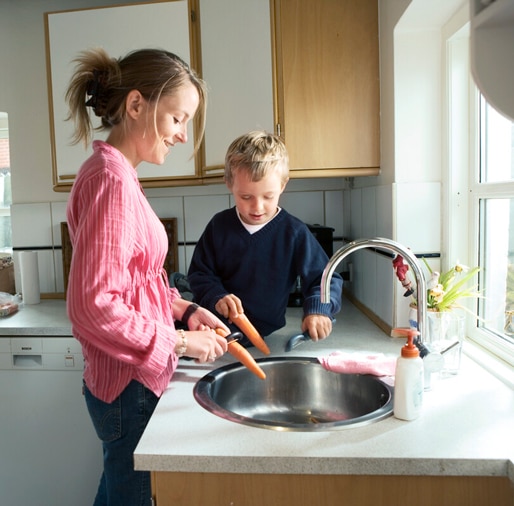
What to eat and drink with an ileostomy or colostomy
When having an ileostomy or colostomy you may a few questions around your diet – should I eat a special diet? Is there something I cannot eat? What about alcohol?

In one word, no. In general, the food that was good and healthy for you before your surgery is still good for you – and the same goes for the more unhealthy options. That being said we have a few tips and some information around different types of food and beverages in the below sections –relevant for people with an ileostomy or colostomy… And maybe others could get inspired too.
What to eat and drink with a stoma
In general, people with an ostomy can eat and drink what they want unless the surgeon or ostomy therapist has given counter-advice. But as before the surgery some food may be easier to digest than others – and right after surgery it may be helpful to pay some extra attention to the signals from your body.
Right after surgery
New research shows that the quicker after surgery you eat real food the sooner the intestinal system will function again. And always Remember to chew your food thoroughly.
During the first 2-4 weeks
- Your body is still healing, and eating foods that are softer or easier to digest will allow your body to recover.
- You may feel a bit bloated, so try eating little and often at first.
- Quite bland foods can be good for a start.
- Chewing carefully is very important.
Week 4-6 after ostomy surgery
- Often there is a reduction in appetite the first 4-6 weeks after an ostomy procedure.
- It can be necessary to supplement the diet with protein and energy drinks. They can be bought at the pharmacy or made from scratch.
Is there something I cannot eat?
There’s no reason to restrict yourself from certain foods, but it’s good to know that different food will have different effects on the output from your stoma. If there’s a particular kind of food that you’re unsure about, just try a small amount. If there are no problems, then go for it!
Don’t be scared of trying new foods, but just be sensible. You will probably find that certain foods produce more gas than others, and even though they are not bad for you, you may want to cut down on these foods. The same applies to chewing gum.
It will only take a little trial-and-error to find a balanced diet that feels right for you. Some foods, especially high fibre foods, can cause a food blockage, where undigested parts of food block the bowel. Chewing well can help, but a food blockage can be serious.
How about fruit and vegetables?
You can still get your five-a-day! The skins of some fruits and vegetables are really tough, so it might be best to peel them to avoid any problems, especially potato skins and apple skins. And maybe you need to prepare your fruit and vegetables in new ways – try soups to get those vegetables in, or maybe try some fruit smoothies.
Allowing vegetables to soften a bit during cooking can also help, or try mashing some of those root vegetables.
If an accident occurs
One bad experience should not lead to you never eating that one thing again. Only if it happens repetitively you should consider taking the food out of your diet.
And remember; everyone has different reactions, so what works for one may not work for one other.
Download the Coloplast Ostomy Cook book
This is not a scientific cookbook. It is a collection of inspirational food ideas, provided by people with an ostomy.
These are their personal recipes, using their favourite food. Please remember that you should always follow any specific dietary advice that you have been given by your healthcare provider or nurse.
Dietary advice for people with an ostomy
Different food will have different effects on the output from your stoma. If there's a particular kind of food that your're unsure about, just try a small amount. If there aren't any problems, then go for it!

What you drink affects the digestive system
Recommendations for all, suggest that at least 2 litres of liquid should be taken a day - this also helps to avoid constipation. But you may wonder if you can still have your morning coffee, enjoy a glass of wine or drink carbonated drinks.
Here are a few guidelines:
- Coffee and tea are fine, but as with anything else be aware of any reactions in your digestive system
- Carbonated drinks in general can cause gas
- Beer can cause the output from the ostomy to become more liquid
- You can drink alcohol. However alcohol can cause dehydration, so make sure to drink enough water.
If you have an ileostomy
Especially right after surgery, you may lose some fluid due to the relatively large amount of stool (750-1300 ml). Thus it’s recommended that you drink at least 2 litres of water per day plus the equivalent of what you lose via the stool.
3-12 weeks after surgery, the small intestine gradually gets used to absorbing more liquid and you may not have to compensate the same way as in the beginning. People with an ileostomy lose two to three times more liquid and salt than other people through the stool, so sprinkling a little salt on your food may be a good idea.

Get ready for dining out
It might feel like a big step at first, but there is no reason why you shouldn’t be able to enjoy a meal out in a restaurant.
Be well-prepared
You can always contact the restaurant before you go so that you are prepared ahead of time, and a lot of the bigger restaurants have their menus online so you can always check the menu before you arrive at the restaurant.
Where to go?
A good idea is to start with a restaurant you know well and keep it simple when ordering. There is no need to be too cautious, just be practical. Order what you want, but be aware of how certain foods make you react. Also, don’t be afraid to ask the waiter what ingredients are used for the meals.
If possible, you may want to order a type of food that you have already tried at home first so you know how you will be likely to react. As you slowly eat more and different foods, you will feel more confident when eating out as well. Even if you are used to having a drink at home, it could be best to 'start small'. For example, drink a small beer rather than a large one. This will help your body build up your tolerance to alcohol again and help reduce – or completely avoid – any reactions.

Experiencing diarrhea?
Like everyone else, you may have diarrhea once-in-a-while. Find out what to do when it happens.
What to do about diarrhea?
Like everyone else, you may have diarrhea once-in-a-while. But in general, a brief period of diarrhea is not something to be worried about – it could be related to something you ate and will often take care of itself.
However, three or more loose stools in a row are indeed a cause for concern, as you risk becoming dehydrated, and you should consult your ostomy care nurse.
If you have an ileostomy
If you have an ileostomy and experience diarrhea you will lose a lot of salt – around 1 tea spoon per litre of stool. Therefore, it is very important to sprinkle some extra salt on your meals.
Trouble with food blockage?
Some food may cause a food blockage, so read about how to prevent it and what to do in case it happens.
Learn about food blockage - and what to do
Chewing carefully is very important to get a good start to the digestive process. This applies especially if you eat foods that are hard to digest (such as nuts). Some foods, especially high fibre foods, can cause a food blockage, where undigested parts of food block the bowel. Chewing well can help, but a food blockage can be serious.
How do I know I have a food blockage?
It can cause cramping; pain and watery stool, and your abdomen and ostomy may become swollen. If you think you have a food blockage, you should:
- Call your doctor or nurse or go to an emergency room.
- Drink plenty of water
- Avoid solid foods for 24 hours and stick to soups instead
Preventing a blockage is easier than treating one, so chew your food thoroughly and be sensible with your food options, and you should be able to have a normal, healthy diet.

How can Coloplast Care make a difference for you?
- Reliable advice, whenever you need it
- Supplement the education and advice you get from your stoma care nurse
- Guidance on selecting the right products
- Easy access to samples of relevant products
- Free home visits by Coloplast Stoma Care nurses
Life with an ostomy isn't always straightforward. So why go it alone?
